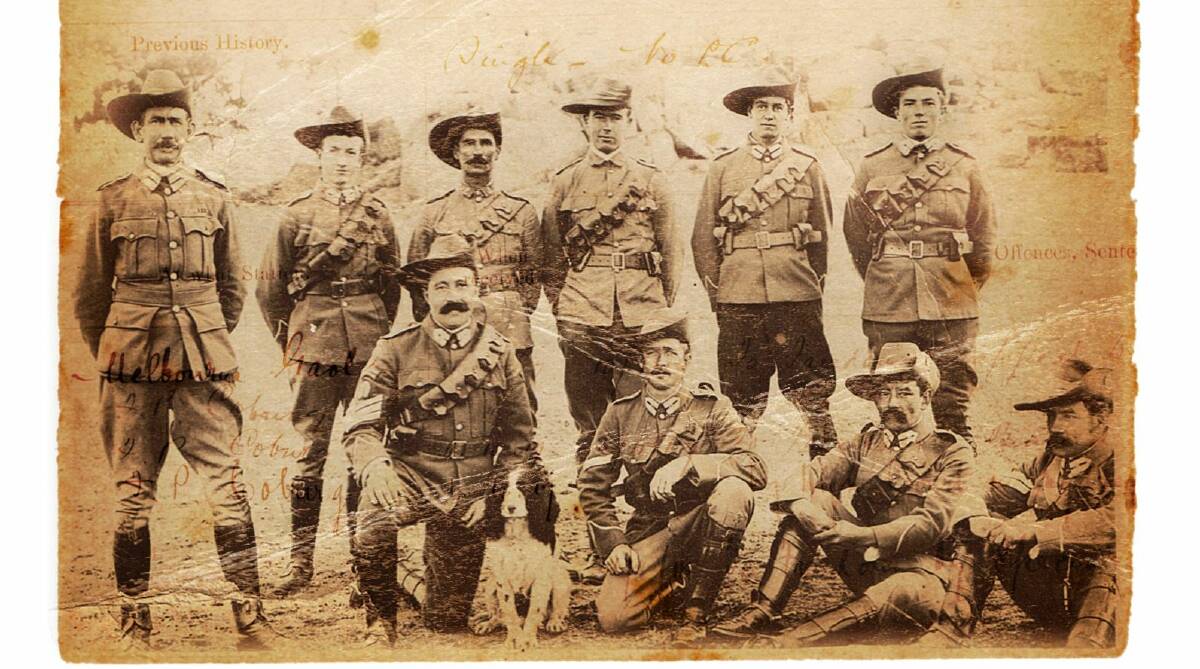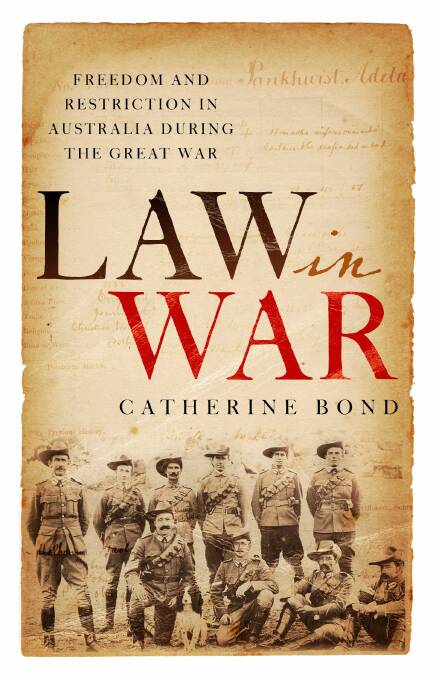- Law in War: Freedom and Restriction in Australia in the Great War, by Catherine Bond. NewSouth. $34.99.

Catherine Bond, an Associate Professor in the Faculty of Law at UNSW Sydney, describes her book as "legally minded". It is certainly that, written with the precision and logic and ruthlessness a reader might expect from a writer with a solid legal training.
Subscribe now for unlimited access.
$0/
(min cost $0)
or signup to continue reading
Accustomed to reading historians on the Great War, I found it refreshing to find a differently trained and experienced mind grappling with issues of significance and importance.
Except for the one great howler at the very start of the book, a howler I doubt an historian would be inclined to make. Catherine Bond bestowed on Prime Minister 'Billy' Hughes a knighthood which the slippery, cunning and grasping little man neither deserved nor received. It is almost as ludicrous as Prime Minister Abbott bestowing a knighthood on His Royal Highness the Prince Philip. Unfortunately the second knighthood stands, the first is a fantasy.
But such an error is a trifle set against the real achievement of this book. It is a detailed and compelling study of the operations of the War Precautions Act and the War Precautions Regulations in Australia from 1914 to about 1920, or even later. It shows Hughes at his worst with scant regard for liberty or the operations of normal Australian society. It shows a supine High Court and a supine judicial system generally and it shows Robert Garran, Australia's early exemplar public servant, in a bad light.
It is surprising how many original topics can still be found in discussions of the Great War and Australia. Catherine Bond shows how lightly official historian Ernest Scott glanced over the operations of the Act and Regulations, how unperturbed he was for the surrender of Australian rights and liberties in his lengthy, and somewhat ponderous, official history, Australia During the War.
The method of this book is the most pleasing aspect of it. Of course there is a deal of wrangling about the law which is interesting and, to a non-lawyer, entertaining. But mainly the argument proceeds by the forensic examination of individual cases affecting real and, often, traduced characters.

We meet victims who stoically put up with years of incarceration in Australia's concentration camps for enemy aliens even though the incarcerated person may have displayed no evidence of disloyalty and in many cases were already naturalised British citizens. But rights are trampled over and liberty a toy in Hughes's hands, all in the name of the most intense prosecution of the war.
Perhaps the worst of the many cases Bond discusses in Law in War is that of Franz Wallach who worked with the Australian Metal Company which Hughes believed was a German front. In Parliament in November 1914 Hughes claimed that "[the company]has nothing Australian about it but its name". That statement just about settled Franz Wallach's fate. Though born in Frankfurt in 1871, in 1892 he arrived in Victoria and in 1895 he renounced his German citizenship and in 1898 he became a naturalised British subject. Little good it did him.
On 22 July 1915 a warrant was issued for Franz Wallach's arrest under the terms of War Precautions Regulations. But he had already been arrested on 10 July 1915. At the age of 44, after having lived in Australia for 23 years, Wallach was in the Langwarrin Concentration Camp and he remained in internment until 26 April 1919. He lost his marriage and his physical and mental health. Catherine Bond closely examines the intricacies of the court battles that were waged on his behalf all unsuccessfully. The son of his second marriage, Stewart, served Australia, in the Royal Australian Air Force, in the Second World War. His father, Franz Wallach, was listed as his next-of-kin.
Then we meet a truly unpleasant Victorian police officer on loan to the Commonwealth who reaps the Commonwealth a tidy sum in exacting fines but who seems to delight in pursuing his victims. He is paid a bonus, his victims are fined time and time again. We meet another police officer who has his prey banged up for years possibly because he feared retribution from this rightly incensed citizen.
Who knew that the Nicholas fortune, think "Aspro", grew out of the operations of the Patents, Trade Marks and Designs Act of 1914 which empowered the Governor-General 'to make regulations to suspend specific enemy-owned and registered patents.' The two Nicholas brothers and others beavered away at creating a substitute to the Bayer (German manufactured) aspirin and, successful, they never looked back on their way to mighty wealth. There is a sting in the tale of many of the stories Bond tells and a beauty relating to "Aspro".
If Australians thought they were fighting the war to put an end to German tyranny, they seemed largely unaware of the Australian tyranny imposed on them. Bond points out that many citizens might, without ever knowing it, have been in serious breach of some law or regulation. We need to be constantly vigilant.
- Michael McKernan is a former deputy director of the Australian War Memorial.

